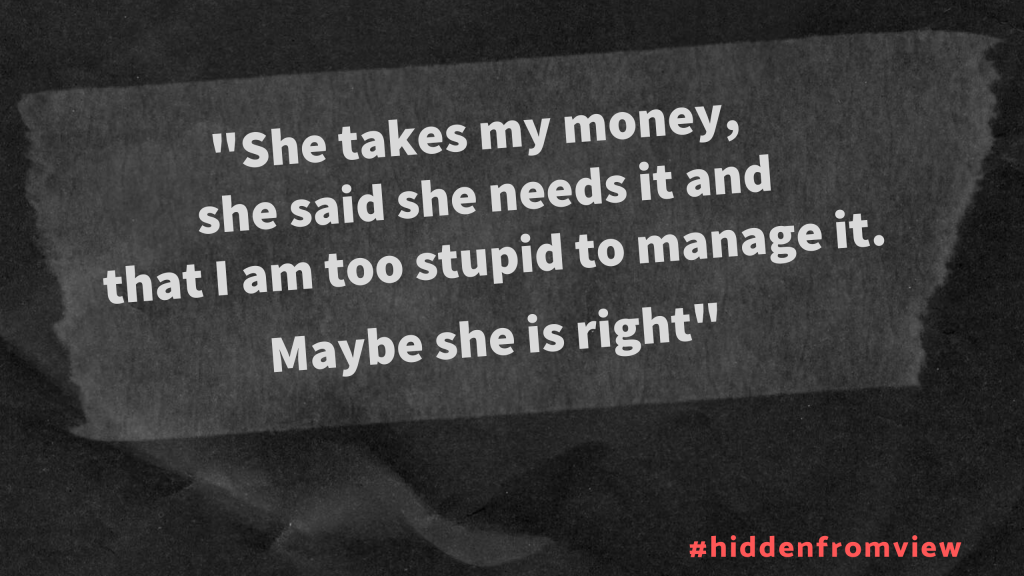Talking about money is never easy and it’s common for couples to occasionally argue about money or bills. Some couples agree to have one person handle financial things, whilst the other does something equally important like childcare or managing the housework.
But when it comes to financial abuse, though, it’s common for one partner to control all the money (wages, benefits, credit cards, etc.) in an unhealthy and manipulative way. This is known as Financial abuse and it is a form of domestic abuse.
Financial abuse can vary from situation to situation since there isn’t one way to handle money in a relationship. This makes identifying abusive tactics all the more difficult, as abusive partners may argue that “this is just how our relationship works.”
What are the signs of financial abuse?
It can be difficult to recognize the signs of financial abuse, as it could start with innocent-sounding requests for some money, perhaps taking a tenner from your purse/wallet without asking. Or maybe suggesting it might be better if you didn’t work or look after the children while they go out to work.
You might be in a financially abusive relationship if your partner…
- Does your partner require you to account for every penny you spend?
- Do they control how all of the household finances are spent?
- Do they threaten to cut you off financially when you disagree with them on anything?
- Have they ever stolen money from you?
- Have they prevented you from accessing your own or joint account?
- Have they intentionally damaged possessions which then have to be replaced by you?
- Do they insist that your benefits are in their name?
- Have they raised debts in your name? Such as credit cards, payday loans or bank loans?
- Have they stopped you from taking a job because it didn’t suit them?
- Have they prevented you from working by hiding your keys, or offering to look after children or pets and then not showing up?
- Have they engaged in other forms of abuse like name-calling or physical abuse when they get angry over your spending habits?
If you said yes to any of these points above, then you may be in a financially abusive situation but help is available!
If you are worried your partner has taken out debt in your name without telling you?
To monitor it, check your credit report (for free) and look out for applications and unusual products that you didn’t apply for. If it’s happened, it is fraud and you most likely won’t have to pay it back.
Report it to the PSNI and your bank straight away!!
Make sure to get copies of your financial data like credit cards, benefits, and financial statements. Make copies if it is unsafe to take the originals. This could be useful later in proving who owns what. Keep this documentation in a safe place where the abusive partner can’t access it.
Where to get help?
If you are unsure of your next step, then you can ring the 24-Hour Helpline for Victims of Domestic and Sexual Abuse.
This is a helpline to provide support, advice and signposting service for all women and men who have been affected by domestic or sexual abuse. The 24-Hour helpline is a completely confidential service and will signpost you onto organisations such as The Rainbow Project and CaraFriend Here NI for support.
Telephone: 0808 802 1414 ( Free from landlines and mobile phones)
Website: www.dsahelpline.org
Twitter: www.twitter.com/dsahelpline
Facebook: www.facebook.com/dsahelpline
Or if you wish to speak to someone from the LGBT Centre, then you speak to us in complete confidence. The hours are Monday to Friday, 9am -5pm. We can provide support to report incidents, legal advice and ongoing support.
Aisling Twomey (Pronouns: Her/ She)
LGBT Advocacy Officer – The Rainbow Project
Telephone: 02890 319030
Mobile: 07904864957
Email: advocacy@rainbow-project.org
Amanda McGurk (Pronouns: Her/ She)
LBTI Support Officer – Cara-Friend and HereNI
Telephone: 02890 890202
Mobile: 07849912877
Email: amanda.mcgurk@cara-friend.org.uk

